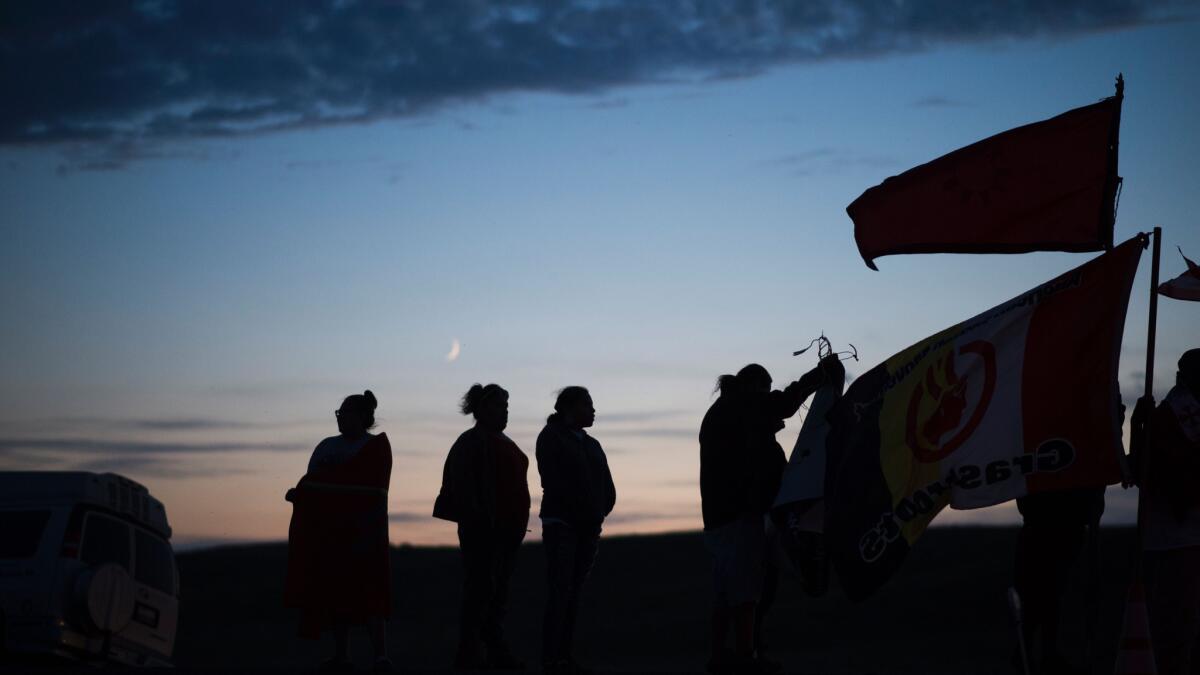Judge orders partial halt to North Dakota pipeline construction; protest rolls on

Reporting from Washington — An American Indian tribe has succeeded in getting a federal judge to temporarily stop construction on some, but not all, of a $3.8-billion, four-state oil pipeline, but its broader mission still hangs in the balance.
U.S. District Judge James Boasberg ruled Tuesday that work will temporarily stop between North Dakota’s State Highway 1806 and a point 20 miles east of Lake Oahe, but may continue on privately owned land west of the highway because he believes the U.S. Army Corps of Engineers lacks jurisdiction on private property.
The judge said he would rule by the end of the day Friday on the Standing Rock Sioux Tribe’s challenge of federal regulators’ decision to grant permits to the Dallas-based operators of the Dakota Access Pipeline, which will cross North Dakota, South Dakota, Iowa and Illinois.
A weekend confrontation between protesters and construction workers near Lake Oahe prompted the tribe to ask Sunday for a temporary stop of construction. Four private security guards and two guard dogs received medical treatment, officials said, while a tribal spokesman noted that six people — including a child — were bitten by the dogs and at least 30 people were pepper-sprayed.
In the latest escalation of tensions, North Dakota authorities said they planned to pursue charges against Green Party presidential candidate Jill Stein for spray-painting construction equipment at a Dakota Access Pipeline protest, likely for trespassing and vandalism. A spokeswoman for Stein says that activists invited her to leave a message at the protest site. She says Stein wrote “I approve this message” in red spray paint on the blade of a bulldozer.
Standing Rock Sioux tribal Chairman Dave Archambault II issued a statement after Tuesday’s ruling, saying: “Today’s denial of a temporary restraining order ... west of Lake Oahe puts my people’s sacred places at further risk of ruin and desecration.” Attorney Jan Hasselman of Earthjustice, who filed the broader lawsuit on behalf of the tribe, noted the tribe will “know more by the end of the week about where we’re heading.”
A spokeswoman for Energy Transfer Partners didn’t immediately respond to telephone messages requesting comment.
Leone also said in court that there were two more attacks on crews in North Dakota on Tuesday. Morton County Sheriff Kyle Kirchmeier said law enforcement officers pulled back from responding to a report of 150-200 protesters gathered at a construction area on private land because they determined that it wasn’t safe to respond.
He said some protesters had hatchets and knives, and two secured themselves to heavy equipment. No pipeline workers were at the site, and no arrests have been made.

Over the weekend, workers allegedly bulldozed sites on private land that Hasselman said in court documents was “of great historic and cultural significance to the tribe.” The tribe’s cultural expert, Tim Mentz Sr., said in court documents that the tribe believes there are human remains in the area and that it wants “an opportunity to rebury our relatives.”
“The elders say that reburying can help deal with the loss and hurt of disturbing these graves,” he said.
Lawyers for Energy Transfer Partners filed court documents Tuesday morning denying that workers had destroyed any cultural sites and asking the judge to reject the tribes’ request for a temporary work stoppage. The company said it “has taken and continues to take every reasonable precaution” to protect cultural sites.
The U.S. Army Corps of Engineers didn’t oppose the tribe’s most recent request, with Assistant Atty. Gen. John Cruden saying in court documents that “the public interest would be served by preserving peace.”
The tribe’s outstanding lawsuit attempts to halt construction of the pipeline, which passes within a mile of the Standing Rock Sioux reservation and is due to be finished this year. The suit says the project violates several federal laws, including the National Historic Preservation Act, will harm water supplies on the reservation and downstream and disturb ancient sacred sites.
Hundreds of protesters have camped out near the reservation for weeks. Stein, who advocates for clean energy, spent Monday evening with them, when she spray-painted the bulldozer, a spokeswoman said.
Kirchmeier said authorities plan to pursue charges of trespassing and vandalism against Stein. State court records Tuesday evening didn’t yet list any formal counts against her.
More to Read
Sign up for Essential California
The most important California stories and recommendations in your inbox every morning.
You may occasionally receive promotional content from the Los Angeles Times.










